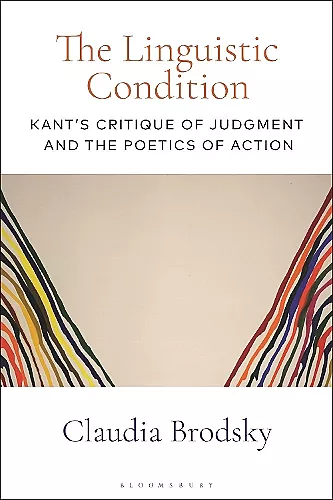The Linguistic Condition
Kant's Critique of Judgment and the Poetics of Action
Professor Claudia Brodsky author
Format:Hardback
Publisher:Bloomsbury Publishing PLC
Published:20th May '21
£95.00
Available to order, but very limited on stock - if we have issues obtaining a copy, we will let you know.

The first book to discuss the role of language in Immanuel Kant’s Critique ofJudgement.
Providing a unique interpretation of Kant’s theory of judgement as integral to his overall project, Claudia Brodsky explores his continued relevance to contemporary theoretical concerns. The Linguistic Condition traces how Kant combined sensus communis, or common sense with the communicative nature of judgement to reveal that, for him, acts of judgement are dependent on their linguistic articulation, so that in Kantian philosophy language and judgement are inextricably linked. In this first in-depth analysis of language in the Critique of Judgement, Brodsky forms creative connections between literature and philosophy.
This is a nigh-monumental, clearly arranged and clearly argued book on the most basic terminological elements of Kant’s Critique of Judgment—which turn out (not surprisingly) to be key to the whole critical enterprise. Brodsky weaves her treatments of those Kantian elements with analyses of their repercussions on the philosophical and literary legacy of a range of thinkers. * Karen Feldman, Professor of German, University of California, Berkeley, USA *
Challenging the canon of received notions about Kant and his project of critique, Brodsky’s brilliant newest book recovers the critical moment in Kant’s theory of judgment as the third and decisive critical force that underpins Kant’s critical project: the linguistic condition. Along the way, the book offers stunning explorations of Rousseau and Diderot as fellow travelers on the critical trajectory they share. Provocative, dazzling, and revelatory, Brodsky liberates Kant from a reception that has alternatively reduced his Critique of Judgment to anaesthetics or a philosophy of nature, illuminating the central linchpin Kant here explores: the power to speak “in a general voice”he so enigmatically calls Gemeinsinn, which allows us to judge but resists the conceptual grasp that any epistemology presupposes. Anything but “Common Sense” of the various longstanding varieties that attempt to conflate commonplace notions with the “grounds” on which we think and speak, Kant opens here a new line of investigation we are yet to fully appreciate. The final chapter offers compelling readings of the elusiveness of judgment in Kleist that demonstrate the poet’s profound affinity with exactly this Kantian concern, and the philosopher's critical affinity with literature. * Willi Goetschel, Professor of German and Philosophy, University of Toronto, Canada *
ISBN: 9781350144378
Dimensions: unknown
Weight: 558g
272 pages